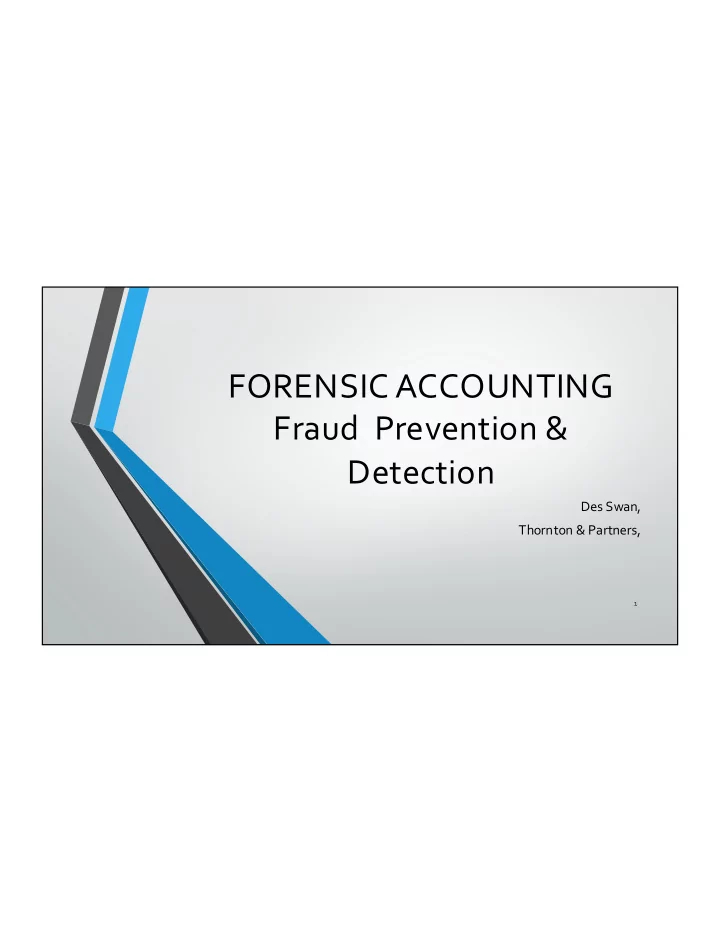

FORENSIC ACCOUNTING Fraud Prevention & Detection Des Swan, Thornton & Partners, 1
OVERVIEW 1. Is Forensic Accounting only to be associated with the Legal cases / Court ? 2. Forensic Accounting on a Day to Day Basis - “ Strikes a balance between all stakeholder expectations" - Company Searches - Business Interruption - Money / Stock Claims - Professional Indemnity Claims - Fidelity Guarantee / Fraud - Other financial losses 3. Types of Documentation / Information requested or reviewed 4. Red Flags 5. Case Studies 6. Questions 2
WHAT IS FORENSIC ACCOUNTING ? a) “Forensic Accounting”, provides an accounting analysis that is suitable to the court which will form the basis for discussion, debate and ultimately dispute resolution. b) Forensic Accounting, sometimes called Investigative Accounting, involves the application of accounting concepts and techniques to legal problems. Forensic Accountants investigate and document financial fraud and white collar crimes such as embezzlement. They also provide litigation support to attorneys and law enforcements agencies investigating financial wrong doing. c) Forensic Accountants are trained to look beyond the numbers and deal with the business reality of the situation. This is the one that applies most of the time. 3
What is Forensic Accounting (continued)? - Not all about the courts - Very high proportion of forensic accounting work never sees the inside of a court room. - Investigative accounting. 4
Forensic Accounting -4 Key Principles - ANAL YSE - INTERPERT - SUMMARISE - PRESENT / REPORT 5
WHAT TYPES OF CLAIMS? • Personal Injury Claims / Motor Vehicle Accidents • Business Interruption • Employee Fraud/ Fidelity Guarantee Policies • Professional Negligence • Product Liability • Stock Losses • Money Losses 6
WHAT’S THE STORY? • Not all about numbers • It’s as much about “substance over form” • The ability to look beyond the numbers and deal with the business reality of the situation • “Common Sense approach” 7
FORENSIC ACCOUNTING ON A DAILY BASIS Large Property Claims • Company Searches • Credit Checks • Analysis of Annual Accounts • Judgements –Companies / Individuals 8
FORENSIC ACCOUNTING ON A DAILY BASIS” Cont’d. BUSINESS INTERRUPTION • Which Accounts ? • Past Performance of the Business • Economic Factors /Trends • Competitive Forces • The Insured / Third Party : Who is He / She. Use objective criteria. Resist bias/subjectivity. • VAT Returns • Employee records • Income Tax Returns 9
EMPLOYEE FRAUD – FIDELITY GUARANTEE • Often after the fact • Complex Transactions to cover their tracks • The perfect system / systems of control has not been invented yet • The fraudster is only interested in the doors left open • Division of Duties • Internal Audit • Improvements to the systems of control post loss. 10
PERSONAL INJURY CLAIMS – Loss of earnings • Many valid cases. • On occasion, they are from a “fantasy world” • Forensic accounting helps build up a financial profile of the claimant • Tax Returns should be available to validate the accounts • Social Welfare records / claims • Alternative sources of income • “Black Economy Activity” (Hard to track down – private investigators) 11
STOCK / MONEY LOSSES • Often no physical evidence post loss • Stock reconciliation exercise using the available accounting information. • Ownership of the stock • Slow moving or obsolete stock 12
DOCUMENTATION/ INFORMATION • Annual Returns to the CRO • Management / Year End Accounts • Turnover schedules – daily, weekly, m onthly (VAT incl. / excl.), • VAT returns • Employee wages records • Leases • Customer Contracts • Production Records • Invoices • Direct access to Customers / Suppliers • Market Research / CSO 13
SOME RED FLAGS Ø “ I don’t know my weekly turnover” Ø “ I don’t know how much money was in the safe” Ø Consequential losses disproportionate to the damage caused Ø Claim for loss of earnings disproportionate to the claimant’s lifestyle or means Ø Poor accounting records / no accounting records Ø Poor systems of control Ø Reluctance to provide documentation. Ø The claimant who presents the perfect or fully substantiated claim at the beginning of the process. ( Exceptions) Ø Issue re a Claimant who presents a perfect claim at beginning of process – rarely happens in the real world. 14
THANK YOU Any questions ??? 15
Recommend
More recommend